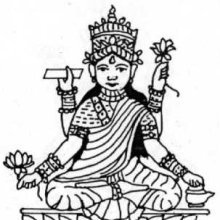Nirvani, Nirvāṇī, Nirvāṇi: 7 definitions
Introduction:
Nirvani means something in Jainism, Prakrit, Hinduism, Sanskrit, Tamil. If you want to know the exact meaning, history, etymology or English translation of this term then check out the descriptions on this page. Add your comment or reference to a book if you want to contribute to this summary article.
Images (photo gallery)
In Jainism
General definition (in Jainism)
Source: archive.org: The Jaina IconographyNirvāṇī (निर्वाणी) or Mahāmānasī is the name of the Yakṣa accompanying Śāntinātha: the sixteenth of twenty-four Tīrthaṃkaras or Jinas, commonly depicted in Jaina iconography.—The cognizance which separates the image of Śāntinātha from those of other Tīrthaṃkaras is a deer. The Yakṣa and Yakṣiṇī attendants escorting him are respectively named as Kiṃpuruṣa and Mahāmānasī (Śvetāmbara: Garuḍa and Nirvāṇī). Rājā Puruṣadatta stands for his Chowri-bearer. The tree under which he attained the Kevala knowledge is Nandi Vṛkṣa.
Nirvāṇī in Śvetāmbara accounts, is represented as seated on a lotus and four-armed, the attributes being a book, lotus, Kamaṇḍalu and a lotus bud. The Digambara books supply descriptions of Mahāmānasī, according; to which, she has the vehicle of a peacock and holds in her hands a disc, fruit, Iḍi (sword?) and Varada. The name Nirvāṇī connotes the idea of Nirvāṇa, llersyrn-bols of a book, lotus, Kamaṇḍalu strike one with her characteristic nature of the wife of Brahmā. Curiously, Brahmā’s wife is alsocalled Sarasvatī. As Mahāmānasī, the Yakṣiṇī holds her new function being a Vidyādevī. Mahāmānasī literally means the “great Goddess to preside over learning”. The symbol of a peacock, again, speaks of her connection with Sarasvatī, the river Goddess, who has the same bird as her riding vehicle..
Source: archive.org: TrisastisalakapurusacaritraNirvāṇi (निर्वाणि) is the name of the Yakṣa (i.e., Śāsanadevatās or ‘messenger-deities’) associated with Śānti-nātha, according to chapter 5.4 [śāntinātha-caritra] of Hemacandra’s 11th century Triṣaṣṭiśalākāpuruṣacaritra: an ancient Sanskrit epic poem narrating the history and legends of sixty-three illustrious persons in Jainism.
Accordingly:—“Originating in that congregation, the Yakṣa Garuḍa, black, whose vehicle was an elephant, boar-faced, whose two right hands held a citron and a lotus, whose two left hands held an ichneumon and a rosary, became Śrī Śānti Svāmin’s messenger-deity. Originating in that congregation, Nirvāṇi, fair-bodied, with a lotus-seat, her two right hands holding a book and a blue lotus, her two left ones a water-jar and lotus, also became the messenger-deity of the Lord of the World”.

Jainism is an Indian religion of Dharma whose doctrine revolves around harmlessness (ahimsa) towards every living being. The two major branches (Digambara and Svetambara) of Jainism stimulate self-control (or, shramana, ‘self-reliance’) and spiritual development through a path of peace for the soul to progess to the ultimate goal.
Languages of India and abroad
Sanskrit dictionary
Source: Cologne Digital Sanskrit Dictionaries: Monier-Williams Sanskrit-English DictionaryNirvāṇī (निर्वाणी):—[=nir-vāṇī] [from nir > niḥ] f. (with Jainas) Name of a deity who executes the commands of the 16th Arhat of the present Ava-sarpiṇī. -1.
Source: DDSA: Paia-sadda-mahannavo; a comprehensive Prakrit Hindi dictionary (S)Nirvāṇī (निर्वाणी) in the Sanskrit language is related to the Prakrit word: Ṇivvāṇī.
[Sanskrit to German]
Sanskrit, also spelled संस्कृतम् (saṃskṛtam), is an ancient language of India commonly seen as the grandmother of the Indo-European language family (even English!). Closely allied with Prakrit and Pali, Sanskrit is more exhaustive in both grammar and terms and has the most extensive collection of literature in the world, greatly surpassing its sister-languages Greek and Latin.
Kannada-English dictionary
Source: Alar: Kannada-English corpusNirvāṇi (ನಿರ್ವಾಣಿ):—
1) [noun] a naked person.
2) [noun] a person who has transcended the worldly attachments, carnal pleasures, sensual enjoyments, etc.
--- OR ---
Nīrvani (ನೀರ್ವನಿ):—[noun] a drop or droplet of water.
Kannada is a Dravidian language (as opposed to the Indo-European language family) mainly spoken in the southwestern region of India.
See also (Relevant definitions)
Starts with: Nirvanika, Nirvanikarana, Nirvanin, Nirvanisu.
Ends with: Alinirvani, Sarvanirvani.
Full-text: Nivvani, Garuda, Mahamanasi, Kimpurusha, Ardhaparyanka, Ardhaparyankasana, Nakkan, Shantinatha, Purushadatta.
Relevant text
Search found 3 books and stories containing Nirvani, Nirvāṇī, Nirvāṇi, Nīrvani; (plurals include: Nirvanis, Nirvāṇīs, Nirvāṇis, Nīrvanis). You can also click to the full overview containing English textual excerpts. Below are direct links for the most relevant articles:
Trishashti Shalaka Purusha Caritra (by Helen M. Johnson)
Part 13: Śānti’s śāsanadevatās (messenger-deities) < [Chapter V - Twelfth incarnation as Śānti]
Part 16: Resumption of Nala story < [Chapter III - Vasudeva’s Marriage with Kanakavatī and her Former Incarnations]
Jain Remains of Ancient Bengal (by Shubha Majumder)
Images of Tīrthaṅkara Śāntinātha (Introduction) < [Chapter 6 - Iconographic Study of Jaina Sculptural Remains]
The twenty-four Tīrthaṅkaras and their Yakṣas and Yakṣiṇīs < [Chapter 6 - Iconographic Study of Jaina Sculptural Remains]
Jainism in Odisha (Orissa) (by Ashis Ranjan Sahoo)
Iconography of Jain Gods and Goddess < [Chapter 6]
